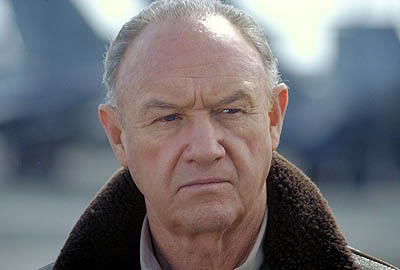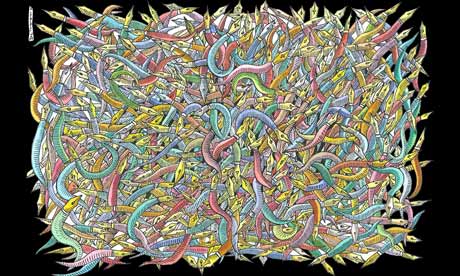From Minds Profound
 David Antrobus Posted on
David Antrobus Posted on  Saturday, May 26, 2012 at 6:23PM
Saturday, May 26, 2012 at 6:23PM  "Innocent of what?" © Unforgiven (1992)Previous articles on Indies Unlimited have established that writing rules are far from absolute, that they are best interpreted more as guides than anything binding. But far more effective than a plainly stated rule is the aphorism, that memorable quote that both entertains and teaches… something. I keep a running list of quotes in general, but those pertaining to writing have pride of place, and they can alternately act as impetus or inspiration when you’re flagging, as an alarm bell when you’re off track, as a way to stay humble when you become overinflated, or simply as a way to laugh at yourself when you happen to forget how absurd you are. I present to you my Top Twenty Awesome Writing Quotes, mostly written by other writers, but remember: whatever germ of a lesson they contain, it’s not a rule, okay?
"Innocent of what?" © Unforgiven (1992)Previous articles on Indies Unlimited have established that writing rules are far from absolute, that they are best interpreted more as guides than anything binding. But far more effective than a plainly stated rule is the aphorism, that memorable quote that both entertains and teaches… something. I keep a running list of quotes in general, but those pertaining to writing have pride of place, and they can alternately act as impetus or inspiration when you’re flagging, as an alarm bell when you’re off track, as a way to stay humble when you become overinflated, or simply as a way to laugh at yourself when you happen to forget how absurd you are. I present to you my Top Twenty Awesome Writing Quotes, mostly written by other writers, but remember: whatever germ of a lesson they contain, it’s not a rule, okay?
20. “I once asked this literary agent what kind of writing paid the best. He said, ‘Ransom notes.’” Get Shorty (1995) – Harry Zimm (Gene Hackman)
Money? I vaguely remember that stuff. It’s green, I think. I swear, incidentally, that Gene Hackman gets some of the most gleefully brilliant lines in Hollywood. As Sheriff Daggett in Unforgiven, after being told he’d just beat the daylights out of an innocent man, he got to say this: “Innocent? Innocent of what?” To which there is quite simply no conceivable answer.
19. “A professional writer is an amateur who didn’t quit.” – Richard Bach
He wrote about a seagull. He said this. Succinct is this guy’s middle name. Or wait, isn’t it “Livingston”? No. No, that was the seagull.
18. “It is impossible to discourage the real writers – they don’t give a damn what you say, they’re going to write.” – Sinclair Lewis
It’s not a job, it’s a calling. Like the urge to use the bathroom. If you feel that, Lewis is talking about you. The writing thing, not the bathroom thing.
17. “If you’re going to be a writer, the first essential is just to write. Do not wait for an idea. Start writing something and the ideas will come. You have to turn the faucet on before the water starts to flow.” – Louis L’Amour
What might have been a fairly ordinary, common sense platitude is rescued—like when the guy with the poncho and the sandblown crowsfeet rides into town—by a startlingly apt metaphor.
16. “I’ve been reading reviews of my stories for twenty-five years, and can’t remember a single useful point in any of them, or the slightest good advice. The only reviewer who ever made an impression on me was Skabichevsky, who prophesied that I would die drunk in the bottom of a ditch.” – Anton Chekhov
Um, only take the bad reviews to heart? No, that’s not what Chekhov’s saying here at all. I’m not really sure what he’s saying, but it made me laugh anyway. Odd. I don’t remember him being this funny in Star Trek.
15. “You must write your first draft with your heart. You rewrite with your head. The first key to writing is to write, not to think!” Finding Forrester (2000) – William Forrester (Sean Connery)
You won’t go too far wrong if you remember this, while simultaneously forgetting Sean Connery ever starred in this clunky embarrassment of a movie.
14. “I’m all in favour of keeping dangerous weapons out of the hands of fools. Let’s start with typewriters.” – Frank Lloyd Wright
Okay, it’s dated, but it’s too good to exclude on that basis. If you must, substitute “laptops” for the last word.
13. “If my doctor told me I had only six minutes to live, I wouldn’t brood. I’d type a little faster.” – Isaac Asimov
He means it, too. You can just tell.
12. “There’s no free lunch. Writing is work. It’s also gambling. You don’t get a pension plan. Other people can help you a bit, but essentially you’re on your own. Nobody is making you do this: you chose it, so don’t whine.” – Margaret Atwood
Well, that told us. Wait, I didn’t know that about the pension plan…
10. “To me, the greatest pleasure of writing is not what it’s about, but the inner music the words make.” – Truman Capote
Included here because I agree one hundred per cent. You don’t have to, but it’s my list.
9. “If you can’t annoy somebody with what you write, I think there’s little point in writing.” – Kingsley Amis
Put more strongly than I’d put it, but then again, Amis was by all accounts a class one melonfarmer. I’ve always said, however, that you sure can’t worry about offending people when you write. Unless you’re aiming for anodyne, that is.
8. “I was working on the proof of one of my poems all the morning and took out a comma. In the afternoon, I put it back in.” – Oscar Wilde
The sad part is, I get this. I know this. And I’ll bet you do too. I’ll also bet Wilde was tempted to remove that damn comma again by nightfall.
7. “What creates a writer is huge, psychological dysfunction.” – Kathy Lette
Well, we’ve hinted at it here, before. Kathy Lette, however, just comes right out and says it. And it’s kind of a horrible relief. Like when Asimov’s doctor up there delivers the bad news.
6. “Writing is easy. All you do is stare at a blank sheet of paper until drops of blood form on your forehead.” – Gene Fowler
Easy, you say? Anyone else detect the sarcasm here?
5. “Poets need not go to Niagara to write about the force of falling water.” – Robert Frost
Worth remembering. An antidote to “write what you know”. There’s a reason we have an imagination. But it takes a poet to say it so memorably and so well.
4. “Ever tried? Ever failed? No matter. Try again. Fail again. Fail better.” – Samuel Beckett
And you thought Richard Bach was succinct? Also, why isn’t the word “succinct” only one syllable?
3. “The King died and then the Queen died. That is a story. The King died and then the Queen died of grief. That is a plot.” – E M Forster
Brilliant. Since I like this kind of thing so much, I will throw in a bonus 3.b.: “The cat sat on the mat is not a story. The cat sat on the other cat’s mat is a story.” – John le Carré
2. “Times are bad. Children no longer obey their parents and everyone is writing a book.” – Cicero, circa 43 BC
All I know from this is that things don’t change all that much and that Cicero would probably have a catastrophic mental breakdown if he lived today.
1. “Everywhere I go I’m asked if I think the university stifles writers. My opinion is that they don’t stifle enough of them.” – Flannery O’Connor
Ha ha. That one’s a stand alone. Flannery sure doesn’t need me to expand on it. Not that any of them do, really. But I had to write a blog post, so I have. Enjoy.
Or, as Dorothy Parker (who clearly didn’t have Text Edit handy) once said: “I might repeat to myself, slowly and soothingly, a list of quotations beautiful from minds profound; if I can remember any of the damn things.”
* * * * *
A version of this post appeared on Indies Unlimited on May 18, 2012. David Antrobus also writes for Indies Unlimited and BlergPop. Be sure to check out his work there if you like what you read here.






